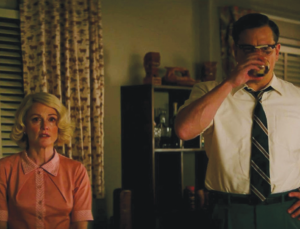★★★☆☆
“It’s another Sunday in Suburbicon.”
This nondescript statement, which appears at the end of the film, highlights the mediocrity of George Clooney’s sixth directorial effort, “Suburbicon.”
Clooney’s reputation as a director has recently been tarnished by films like “The Ides of March” in 2011 and “The Monuments Men” of 2014, which received mixed to poor critical reviews, but the highly anticipated thriller “Suburbicon” seemed like it could bring Clooney some redemption.

“Suburbicon” has all the makings of a great film: an all-star cast, including Matt Damon and Julianne Moore, a script by Joel and Ethan Coen and commentary on a relevant social problem — the persistence of racism in the United States. Unfortunately for Clooney and talented cast, “Suburbicon” is a film filled with too many storylines, yet devoid of any action or interesting characters.
The film centers on Damon’s character, Gardner Lodge, a suburban businessman whose family is torn apart one night when two mobsters break into his home and chloroform his entire family, killing his wife, Margaret, played by Julianne Moore. Although Damon delivers a fair performance given the lackluster script, his character and his motivations are never fully fleshed out.
After Margaret dies, her twin sister, Rose, also played by Moore, spares no time in assuming her role as matriarch of the Lodge household and beginning an affair with Gardner, leaving Gardner’s son Nicky, played by Noah Jupe, caught in an uncomfortable, disturbing situation. The movie attempts to capture the remaining action from Nicky’s point of view, however, Nicky hardly speaks and this viewpoint only serves to disorient the audience and muddle the remainder of the film’s plot.
After a slow-moving first half, the film picks up in its second act with the exciting introduction of Roger, a nosy accountant played by Oscar Isaac. Sent to investigate Gardner’s handling of money following his wife’s death, Isaac manages to deliver comedic lines in the film’s otherwise tense plot. As Roger begins to pry into the Lodges’ household, he begins to break down the superficial world that Gardner and Rose have created for themselves. In this way, Roger is one of the few dynamic characters who does not merely exist as an accessory to the plot, but also helps to move the story along.
As if the main storyline surrounding the Gardner family was not tangled enough, Clooney adds an additional subplot concerning race relations in America. Although it had the potential to be a thought-provoking element in the film, this storyline ultimately fell flat: The Mayers family is the first black family to move into the all-white town of Suburbicon, causing immediate tension. This tension continues to fester throughout the film, culminating in a night of violent riots that cause destruction to the Mayers family’s home.
Although the subject matter is important to discuss and topical, given the events in Charlottesville this summer, Clooney fails to give this storyline adequate screen time. He introduces the likeable Mayers family only to focus on the silly antics of the star-studded white family across the street. The film’s point about racism is unclear because the characters’ underlying motives toward the Mayers family receive little attention. If the film was hoping to deliver a serious social commentary with “Suburbicon,” it woefully missed the mark.
The film had redeeming qualities, however. Its soundtrack, by composer Alexandre Desplat, succeeded in creating an aura of suspense, which one can only assume Clooney and the Coen Brothers intended to create, even when the dialogue failed to do so. The sound effects, too — the eerie tick-tocks of the clock and the heightened thudding during moments of action — serve to manipulate the audience’s emotions.
Additional elements of the film, like Robert Elswit’s cinematography and Jenny Eagan’s costumes, manage to convey the intended rigid tone and picturesque atmosphere, but that does not do much to overcome the film’s other shortcomings.
With “Suburbicon,” Clooney aims to show that the lives of the white, upper-class Gardner family are selfish and frivolous, particularly when compared with the lives of the Mayers family, who face many obstacles in their attempts to lead normal lives. Although the film’s initial premise is compelling, the film commits the fatal flaw of using the Mayers family as a prop rather than as a point of interest and development. In his commendable effort to illuminate the legacy of white supremacy, Clooney sacrifices conviction and engaging dialogue, branding “Suburbicon” as yet another failure in his directorial resume.




















